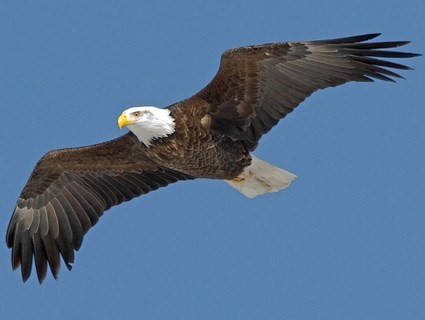When the Continental Congress designated the bald eagle for America’s official seal, they were drawing on centuries of the bird’s symbolism, especially in Christian cultures. Although eagles were seen as symbols of strength and power earlier, even in ancient Rome, its adoption by early Christian churches made it emblematic of a perfect leader, its keen eyesight likened to the divine all-seeing power. That’s why renaissance art often depicts eagles with halos, and why their continuation as America’s mascot must now be politically incorrect.
Anyway, we can’t really say “bald” anymore, lest we offend someone. People who lose their hair suffer from alopecia, not baldness. And the word “eagle” itself was derived from the Latin word “aquila,” the feminine form of “aquilus,” which meant “dark-colored.” How insensitive can a bird’s name be?
An Internet search on Bing reveals the origin of the name “bald eagle” in the 17th Century. After explaining that word “bald” meant something different back then, the article exclaims, “So the bald eagle is not actually bald!” Or alopecic, to be fair.
If you wonder where birds get their names, you may be surprised to know it’s one of the few things no government decides. Since the 1880s, a purely private organization with no actual legal power, the American Ornithological Society, has claimed the authority to establish standardized English bird names throughout North and South America. In fact, the organization was just created in 2016 by the merger of the American Ornithologists’ Union and the Cooper Ornithological Society, both founded in the 19th century by bird collectors. The membership today includes many ornithologists but is open to anyone paying the $90 annual dues, as about 2,800 people do.
When the two old organizations decided to merge, one of the first items on the agenda was re-examining the names of thousands of bird species. You see, the bald eagle isn’t the only politically incorrect bird name – there are hundreds. Even the Cooper Ornithological Society itself was named after a person, a Civil War-era army surgeon named James Graham Cooper, whose participation in army expeditions in Apache territory in Arizona, and in railroad surveys in the Pacific Northwest, would sure disqualify him from naming rights to anything in today’s cancel culture.
The newly reformed American Ornithological Society began its discussion with the predictable assertion that no bird should be named after any person whose dark past might have any connection to racism. In fact, their target list begins with Cooper’s Hawk, and Steller’s Jay, the latter named for a German naturalist and explorer whose namesakes include at least 3 birds, 2 mammals, a fish, a mineral, and a rock formation in Alaska. What a show-off. The group also targets Wilson’s Warbler, named for the father of ornithology in America, Alexander Wilson, who inspired Audubon himself to become an ornithologist. Audubon was a slave owner, so even the modern organization that bears his name is debating cancelling him from its own history. Wilson apparently had an affair with a married woman, so better cancel him and all five birds named for him, too.
The society began in 2019 with a controversial renaming of “McCown’s Longspur,” because its namesake was a Confederate general. It’s now the “Thick-billed Longspur.” Still, there are over 100 birds named for various people, usually those who discovered them. And how can we now know who held racist views in past centuries? So, the Society announced that it will simply rename all birds that are named for anyone. So goodbye to common names like Anna’s Hummingbird, Gambel’s Quail, Lewis’s Woodpecker, Bewick’s Wren, and Bullock’s Oriole.
Some of these old names, it claims, are not only offensive, but also “exclusionary.” Meaning they are not “welcoming to people of all races and backgrounds.” So, changing their names will remove “barriers to their participation in the world of birds.” This was clearly decided by a committee, in fact one that the Society says was “carefully chosen” because its work “is fairly radical,” according to the Society’s own press release.
An activist group calling itself “Bird Names for Birds” says the issue is that these old names “represent and remember people (mainly white men)” with objectionable histories. Or in some other way offend someone. Like bald people.
This group wants names that “uphold the morals and standards the bird community should memorialize.” I’m for moral standards but might be too old to learn all the new names. I’m probably still going to say, “bald eagle.” After all, these people are not the government.





Comments on this entry are closed.